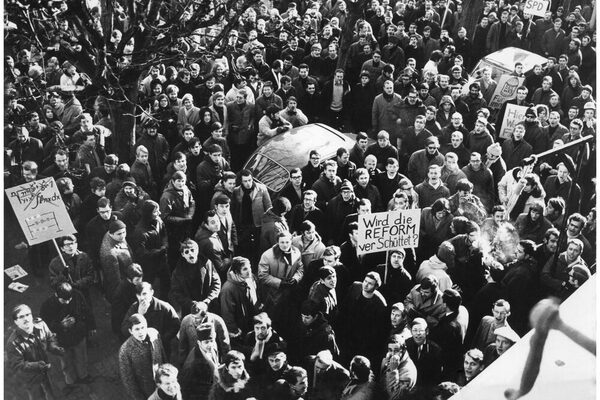New social movements
In May 1968, there was a demonstration by Hessian schoolchildren in Wiesbaden for school reform, followed by similar actions. In October 1968, students from Mainz and Frankfurt protested against the Debutante Ball at the Wiesbaden Kurhaus. Pubs such as the "Bumerang" in Wellritzstraße developed into discussion centers. In the tradition of the political clubs of earlier times, the Club Voltaire was founded in Webergasse in 1967, which became an important meeting place with its bookstore. In 1970, the "Roter Stern" soccer club was founded, which saw itself as part of the left-wing scene and published a newspaper from 1976-82. Pupils and trainees met in the "POP Club" and, supported by the writer Hans-Christian Kirsch, organized events with the authors Alfred Kantorowicz ("Spanish Diary" about the civil war) and Günther Amendt ("Sexfront") and on the history of the Die Linke. The youth center PUB (Politik-Unterhaltung-Bildung), founded in 1972, offered a space for self-designed programs and projects in the "Haus der Heimat" in Friedrichstraße.
Following an initiative by the Young Socialists in June 1971, the "Citizens' Initiative City Ost" was founded to oppose Ernst May's plans to restructure the eastern villa district from a residential area into an administrative area. In the Bergkirchenviertel, the redevelopment and its feared consequences led to an intensification of neighborhood relations, from which Wiesbaden's oldest street festival in Nerostrasse emerged in 1977. In 1977, the "Folklore in the Garden" festival was held for the first time in Freudenberg Castle Park. The festivals in the "Nero", the former Neroberghotel used as a temporary cultural center, fulfilled a similar function.
The groups that took advantage of such opportunities were part of the political and social movements that emerged in all cities around 1980 and soon became stronger. They were also present with information stands in the city and various events, sought discussion with all citizens and in some cases also found space in the churches. The Green Party emerged from the ecological initiatives, which campaigned in particular against nuclear power plants - in Hesse against Biblis. The peace movement was a reaction to the NATO Double-Track Decision of 1979, but took the debate to a more fundamental level. In 1986, the association Eine-Welt-Zentrum Wiesbaden e.V. was founded, which runs the "Weltladen" in its premises.
In 1979, the political gay and lesbian group "Rosa Lüste" was founded, which also had an impact on the scene beyond Wiesbaden through the magazines "LUST- Lesbische Und Schwule Themen" and "Lustblättchen". The AIDS-Hilfe Wiesbaden, part of the gay scene everywhere, has existed since 1986. The women's movement is particularly represented by the "Frauenwerkstatt Wiesbaden - Zentrum für Kommunikation und Bildung e.V.", which has been running the frauen museum wiesbaden since 1984.
One political issue that had a particularly motivating effect in the Rhine-Main region was the planned construction of Runway West. A large demonstration against this took place in Wiesbaden in 1981. The Café Klatsch in Marcobrunner Strasse emerged from the movement against the runway in 1984. It is run as a collective business and supports political projects.
The oldest trendy pub in Wiesbaden, the "Kneipchen" in Scharnhorststraße in Westend, opened back in 1978. Its counterpart in the Bergkirchen district was the "Eckhaus" on the corner of Webergasse and Hirschgraben. Café Cicero in Kirchgasse (City-Passage) was a meeting place and venue for events, including the "Erzählcafe" series. The "Regionalblatt" was published as a left-wing weekly newspaper from 1979-84. The alternative "Buchladen am Sedanplatz" was the place to go. Until 1989, there was the free monthly newspaper "Szene Wiesbaden", a kind of "central organ" for the new social movements with an overview of events and critical commentaries. In 1979, the HinterHaus in Karlstraße was opened as a center for the independent cultural scene, which was used as a cabaret, gallery, film theater and lecture forum. In 1980, many culturally active groups came together to found a joint series of events whose very name was directed against subsidized high culture: the "Other May Festival", which took place for four years.
In the 1980s, several associations were founded that organized events on political, social and historical topics with or without regional reference, such as "Urbanity" or "40 Years of the Federal Republic of Germany": the "Association for Popular Education and Culture", the "Society for the Promotion of Journalism and Communication" and the "Wiesbaden History Workshop". In 1986, the Pariser Hoftheater opened as the second independent cabaret theater, which also offered groups a forum. Since 1985, independent and "alternative" initiatives, mostly cultural, have also been financially supported by the city. Networking between the groups led to joint activities, e.g. in 1992 against the rise of right-wing radicalism under the motto "Wiesbaden is colorful and will stay that way."
Literature
Schabe, Peter: Culture in Wiesbaden. The handbook. Cultural Office of the City of Wiesbaden (ed.), Wiesbaden 1990.
